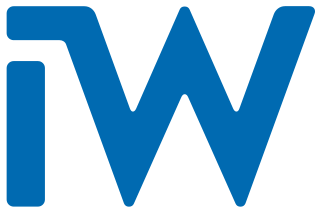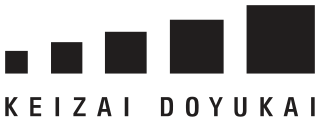Related Research Articles

A think tank, or policy institute, is a research institute that performs research and advocacy concerning topics such as social policy, political strategy, economics, military, technology, and culture. Most think tanks are non-governmental organizations, but some are semi-autonomous agencies within government or are associated with particular political parties, businesses or the military. Think-tank funding often includes a combination of donations from wealthy individuals and personal contributions, with many also accepting government grants.

Innovation is the practical implementation of ideas that result in the introduction of new goods or services or improvement in offering goods or services. ISO TC 279 in the standard ISO 56000:2020 defines innovation as "a new or changed entity realizing or redistributing value". Others have different definitions; a common element in the definitions is a focus on newness, improvement, and spread of ideas or technologies.

The International Chamber of Commerce is the largest, most representative business organization in the world. Its over 45 million members in over 100 countries have interests spanning every sector of private enterprise.
Employment is a relationship between two parties regulating the provision of paid labour services. Usually based on a contract, one party, the employer, which might be a corporation, a not-for-profit organization, a co-operative, or any other entity, pays the other, the employee, in return for carrying out assigned work. Employees work in return for wages, which can be paid on the basis of an hourly rate, by piecework or an annual salary, depending on the type of work an employee does, the prevailing conditions of the sector and the bargaining power between the parties. Employees in some sectors may receive gratuities, bonus payments or stock options. In some types of employment, employees may receive benefits in addition to payment. Benefits may include health insurance, housing, disability insurance. Employment is typically governed by employment laws, organisation or legal contracts.

Science policy is concerned with the allocation of resources for the conduct of science towards the goal of best serving the public interest. Topics include the funding of science, the careers of scientists, and the translation of scientific discoveries into technological innovation to promote commercial product development, competitiveness, economic growth and economic development. Science policy focuses on knowledge production and role of knowledge networks, collaborations, and the complex distributions of expertise, equipment, and know-how. Understanding the processes and organizational context of generating novel and innovative science and engineering ideas is a core concern of science policy. Science policy topics include weapons development, health care and environmental monitoring.

The American Public Transportation Association (APTA) is a nonprofit group of approximately 1,500 public and private sector member organizations that promotes and advocates for the interests of the public transportation industry in the United States.
An information technology audit, or information systems audit, is an examination of the management controls within an Information technology (IT) infrastructure and business applications. The evaluation of evidence obtained determines if the information systems are safeguarding assets, maintaining data integrity, and operating effectively to achieve the organization's goals or objectives. These reviews may be performed in conjunction with a financial statement audit, internal audit, or other form of attestation engagement.

The German Economic Institute (IW) is a private economic research institute in Germany, which promotes a liberal economic and social order. The German Economic Institute is based in Cologne, Germany, with additional offices in Berlin, Germany, and Brussels, Belgium.

The Indian Institute of Foreign Trade (IIFT) is a civil services training institute for the one of the central civil services Group 'A' Gazetted cadre also known as Indian Trade Service cadre, located in New Delhi, India.
The Asia Foundation is a nonprofit international development organization committed to "improving lives across a dynamic and developing Asia". The Asia Foundation (TAF) was established in 1954 to undertake cultural and educational activities on behalf of the United States Government in ways not open to official U.S. agencies. Headquartered in San Francisco, The Asia Foundation works through a network of 18 offices in 18 Asian countries and in Washington, DC.
The Charles H. Revson Foundation was founded in 1956 by Charles H. Revson, the founding President of Revlon Cosmetics as a vehicle for his charitable giving. He willed half of his estate to the Foundation upon his death. Julie Sandorf has been the President of the Foundation since January 2008.
Sustainable procurement is a process whereby organizations meet their needs for goods, services, works and utilities in a way that achieves value for money on a life-cycle basis while addressing equity principles for sustainable development, therefore benefiting societies and the environment across time and geographies. Procurement is often conducted via a tendering or competitive bidding process. The process is used to ensure the buyer receives goods, services or works for the best possible price, when aspects such as quality, quantity, time, and location are compared. Procurement is considered sustainable when organizations broadens this framework by meeting their needs for goods, services, works, and utilities in a way that achieves value for money and promotes positive outcomes not only for the organization itself but for the economy, environment, and society. This framework is also known as the triple bottom line, which is a business accounting framework. The concept of TBL is narrowly prescribed, and even John Elkington, who coined the term in the 1990s, now advocates its recall. Indeed, procurement practitioners have drawn attention to the fact that buying from smaller firms, locally, is an important aspect of sustainable procurement in the public sector. Ethics, culture, safety, diversity, inclusion, justice, human rights and the environment are additionally listed as important aspects of SPP.

The Nuclear Energy Institute (NEI) is a nuclear industry trade association in the United States of America, based in Washington, D.C.

Steve Hatfield Dodds is an Australian philosophical economist, with notable work in the social cost of economic decision-making and particularly sustainable development and the economic impact of climate change.

The New England Board of Higher Education (NEBHE) is an interstate compact that was founded in 1955, when six visionary New England governors – realizing that the future prosperity of New England rested on higher education – committed their states to the shared pursuit of academic excellence. Soon thereafter, NEBHE was approved by New England’s six state legislatures and authorized by the U.S. Congress. NEBHE serves the six New England states: Connecticut, Maine, Massachusetts, New Hampshire, Rhode Island, and Vermont.
The Office of Social Innovation and Civic Participation was an office new to the Obama Administration, created within the White House, to catalyze new and innovative ways of encouraging government to do business differently. Its first director was the economist Sonal Shah. The final director was David Wilkinson.
BIPAC is a bi-partisan, membership-supported, mission-driven, organization working to improve the political climate in America for the business community and help employers and employees play a more active role in public policy and the political process.
A sustainability organization is (1) an organized group of people that aims to advance sustainability and/or (2) those actions of organizing something sustainably. Unlike many business organizations, sustainability organizations are not limited to implementing sustainability strategies which provide them with economic and cultural benefits attained through environmental responsibility. For sustainability organizations, sustainability can also be an end in itself without further justifications.

The Arizona Chamber of Commerce and Industry is an Arizona based chamber of commerce. Since 1974, the Arizona Chamber of Commerce and Industry has been promoting statewide business advocacy at the Arizona Capitol and with the Arizona congressional delegation. Its membership employs 250,000 Arizonans from all sectors of the Arizona economy. The Board of Directors of the Arizona Chamber of Commerce and Industry is composed of more than 120 business executives, representing industries across Arizona. The Arizona Chamber is governed by the board of directors and its 32 Executive Committee members, including the nine board officers. Following the departure of Glenn Hammer, Garrick Taylor serves as the Interim President & CEO until Danny Seiden starts his tenure early Summer 2021.

The Japan Association of Corporate Executives is a Japanese professional association of independent leading executives. Founded in 1948, the group engages in advocacy on public policy issues related to the development of the Japanese economy in both a domestic and global context. The association is commonly referred to as "Keizai Dōyukai".
References
- 1 2 3 4 "About NJPRO". www.njprofoundation.org. Archived from the original on 2008-07-09.
- ↑ "Archived copy". Archived from the original on 2013-11-01. Retrieved 2013-09-06.
{{cite web}}: CS1 maint: archived copy as title (link)